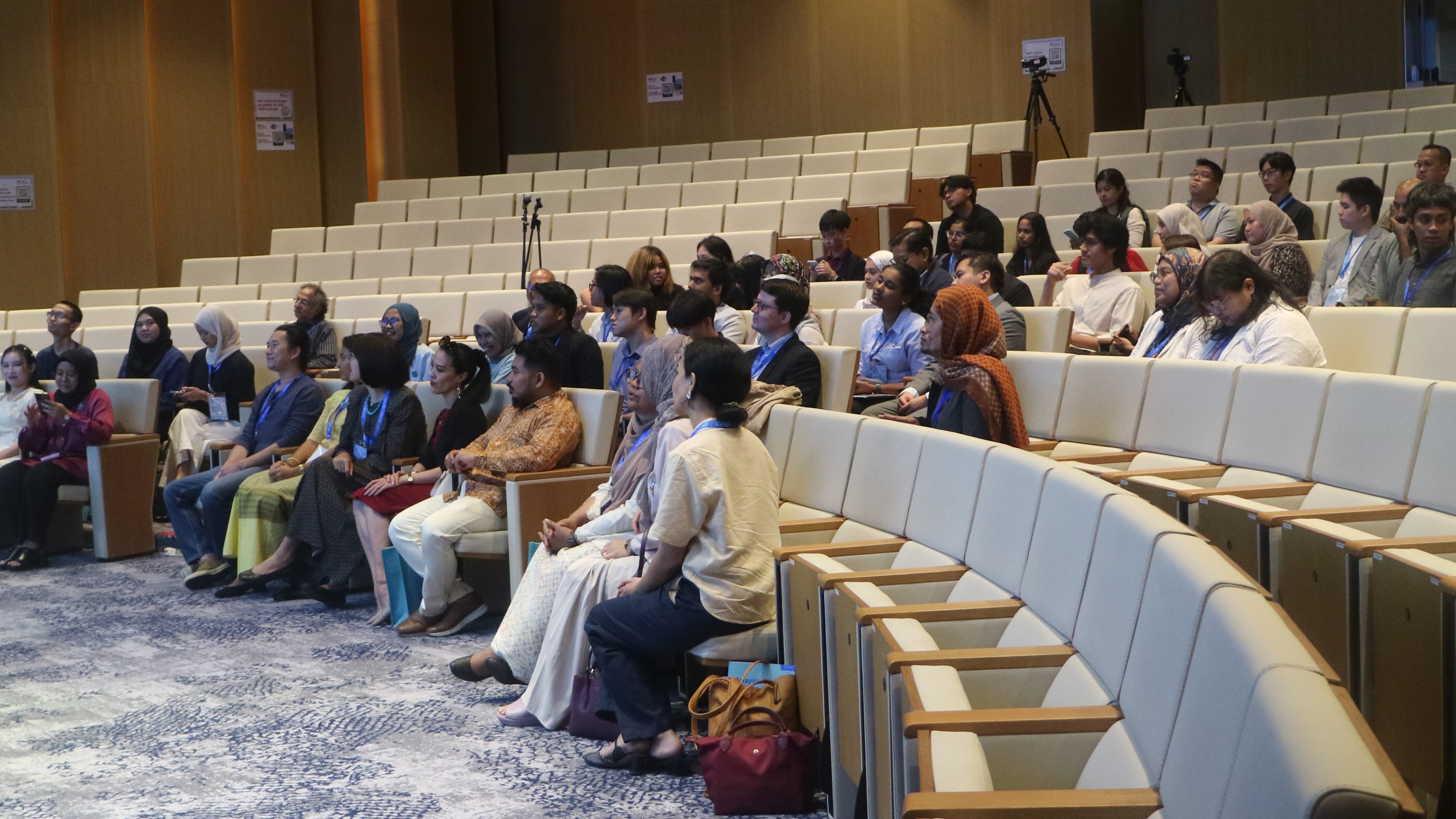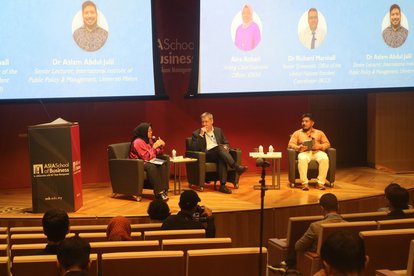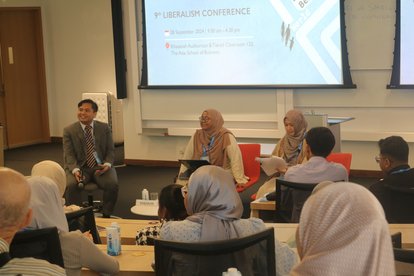Event
IDEAS Liberalism Conference 2024: Borders and Belonging in a Globalized World

IDEAS Liberalism Conference 2024.
© FNF MalaysiaOn September 28, IDEAS Malaysia held its annual flagship event, the Liberalism Conference, co-hosted by the Asia School of Business in Kuala Lumpur. In its 9th edition, the Conference sought to deliberate on the pressing issues of statelessness and refugees, choosing the aptly named “Borders and Belonging in a Globalised World” as its official theme.
The event commenced with welcoming remarks from YAM Tunku Zain Al-’Abidin ibni Tuanku Muhriz (Founding President of IDEAS) and Dr. Renato Lima-de-Oliviera, (Associate Dean of Student Journey and Associate Professor I at Asia School of Business); followed by a keynote speech by Karima El Korri (United Nations Resident Coordinator in Malaysia, Singapore and Brunei Darussalam).
In her keynote address, Karima El Korri noted how human mobility has always been a defining feature of our society, and, therefore, in the discourse of statelessness and refugees, it is even more important to remember and adhere to the principle of “upholding the dignity of the people on the move”. To make sure that, in the face of dynamic global situations, the process of managing human mobility will not succumb into ignorance and abuse
Inclusion & Dignity: Approaches to Statelessness and Refugees

From left to right: Aira Azhari (Acting CEO of IDEAS; moderator), Dr. Richard Marshall (Senior Economist, Office of the United Nations Resident Coordinator (RCO)), Dr. Aslam Abdul Jalil (Senior Lecturer, International Institute of Public Policy & Management, Universiti Malaya).
© FNF MalaysiaIn similar veins, during the first panel discussion, “Inclusion and Dignity: Holistic Approaches to Statelessness, Refugee, and Displacement Challenges”, Dr. Aslam Abdul Jalil (Senior Lecturer of the International Institute of Public Policy & Management, Universiti Malaya) warned of the trap of humanitarian exploitation in arguing for refugees issues. This caution came after Dr. Richard Marshall (Senior Economist at the Office of the United Nations Resident Coordinator (RCO)) argued that the lack of access to basic human rights, such as education and healthcare, afforded to the undocumented people (including the stateless and refugees) in Sabah is responsible in perpetuating the generational poverty among them and arguably contributed to Sabah’s poor economic performance in general.
Dr. Aslam concurred that the economic argument, that is arguing that refugees and stateless people are potential labours who will increase economic participation and drive up productivity for the local economy, is a practical approach which might make the government and society warm up to the idea of the granting of their citizenships. However, such an argument actually harms more than benefits the stateless and refugees in the long run. From that standpoint, they are reduced into a mere productive economic unit to justify their existence. This is no different to other acts of humanitarian exploitation. Consequently, should the stateless people and the refugees not fulfill such economic expectations, the blame would be placed entirely on their shoulders. Society and the government would immediately fault their laziness; when, in reality, there might be underlying structural issues which create the problem in the first place
Concurrent Breakout Session: Impact of Statelessness on Communities

Panelists Siti Rahayu Baharin (Co-Founder of Buku Jalanan Chow Ki) and Dr. Rodziana Mohamed Razali (Associate Professor at Universiti Sains Islam Malaysia) in one of the breakout sessions, "Impact of Statelessness on Communities".
© FNF MalaysiaThe second half of the event introduced a format of concurrent breakout sessions. Participants were given the option to choose a session according to their interests. There were two sessions: 1) Debunking refugee myths and stereotypes; and 2) Impact of statelessness on communities. At that time, FNF Malaysia team decided to attend the second session with Siti Rahayu Baharin (Co-Founder of Buku Jalanan Chow Kit) and Dr. Rodziana Mohamed Razali (Associate Professor at Universiti Sains Islam Malaysia) as the panelists.
In this session, both Cikgu Rahayu and Dr. Rodziana agreed that there are still a lot of structural and legal challenges surrounding the efforts of helping stateless people to acquire citizenship, and, by extension, exercising their rights as citizens. Cikgu Rahayu pointed out how by law, children who are abandoned since birth are automatically granted Malaysian citizenship. However, in reality, abandoned children from birth still have to be registered to relevant offices of authority to have their citizenships recognized.
Such inconsistency between what is stated in the law and the actual implementation is actually a common thing to be found in bureaucratic practices. But, in this case, the negligence on the government’s part is especially harmful because citizenship often becomes the prerequisite of a lot of rights. Without official ID, stateless people are denied access to proper education, healthcare, jobs, and even the right to open bank accounts.
Dr. Rodziana further explained that structural challenges faced by stateless people still persist because misconceptions about stateless people still exist until now. Often, lawmakers refrained from engaging statelessness in good faith. They would make or protect laws based on speculations alone, for example the refusal to streamline the citizenship process because they believed it would result in the increase of marriage of convenience cases or that it would incentivize many immigrants to come into and give birth or leave their children in Malaysia. The blatant lack of political will from lawmakers and authorities also arguably reflect how they view the stateless people. Since their existence will not transfer to votes in the elections, anyway, the lawmakers do not make it their priority to advocate for the rights of the stateless people. Not to mention, the misconception among society at large that views stateless people as the “others”, different from those who are considered “Malaysians”. In fact, many stateless people are actually people who are born in Malaysia, live in Malaysia, and have never been outside of Malaysia.
So how do we move forward, with such existing challenges and resources available to us limited to our capacity as elements of civil society? Cikgu Rahayu and Dr. Rodziana understood that an attempt to counter misconception about statelessness with understanding should be initiated. The forms vary, but civil society sectors should start and keep the conversations about statelessness and refugees going. Amplify them until the “others” becomes “us”. And then, engage with multiple stakeholders, including the government, to make sure that they are informed of the reality faced by the stateless people every day. Although it should also be noted that citizenship should not be viewed as the only solution. Statelessness and refugees are a multilayered phenomenon. The roots of the causes encompass a lot of factors which require a comprehensive and concerted effort to tackle.
Watch the full Conference here: 9th Liberalism Conference
